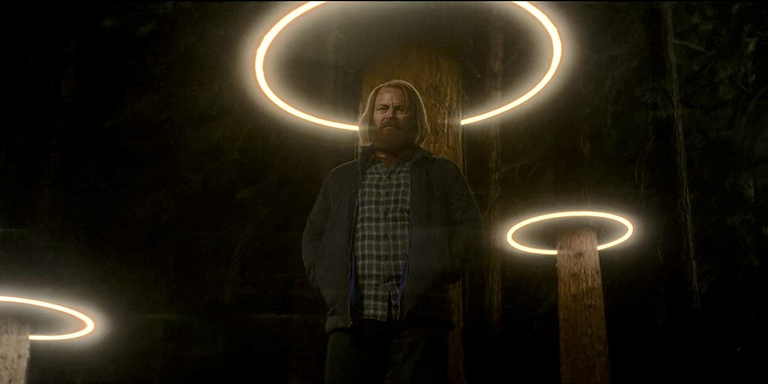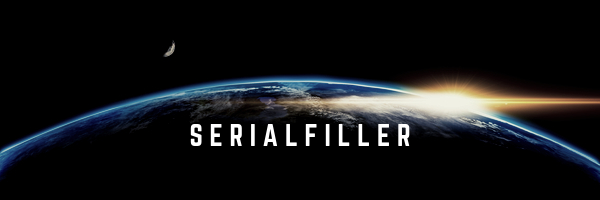Devs is the best new series of the year.



Who would have thought?
In the first quarter of the TV season, we may have a new TV series that's beating the competition.
A show that's unexpectedly on top.
It's Alex Garland's baby, real Deus from Devs.
Pure science fiction, as in science fiction that goes beyond all boundaries, that can cross all boundaries without having to resort to flying saucers, aliens, remote universes.
Garland creates an intimist product but without ever losing sight of the science fiction of which he, since the time of "Ex Machina", is one of the greatest references of world cinema.
With Deus he seems to have reached the perfect synthesis between visual experimentation and narrative.
Every scene in Deus is a beautiful photograph.
Accompanied by soft or psychedelic music, he manages to achieve a perfect combination of aesthetic joy and atmosphere.
Garland manages not to stop at this, adding an excellent but complex horizontal plot that has the advantage of being lightened thanks to the storyline related to Lily, storyline that manages to add speed to a narrative otherwise very slow and suspended.
But the suspension risks to be one of the characterizing qualities of the TV series, just like that big elevator cube that ferries the developers from a real dimension to a possible dimension only once they pass through that door.
But the horizontal plot is perhaps the least interesting thing in the Garland series.
It's all the philosophical implication, the paragraphs in the book that Garland writes
to catch the eye of the beholder.
Science that becomes science fiction, the impossible that becomes possible.
Going back in time, travelling forward in time. In between us and our choices, the so famous
FREE WILL
Just that free will that Lyndon's theory seems to have nullified, even more than Forest's obsession.
So here's the larger philosophical dimension.
Are we the fruit of our choices or are we just puppets in the hands of fate?
Are we the ones choosing our path, day after day, choice after choice, or are we just following a one-way path that will lead us from the first to the last day of our lives to a series of fake choices that we actually reproduce as the steps of an algorithm?
Even when Lily tries to break away from the "divine design" that design will still see the light.
But in between there are always us, stubborn and loving human beings, obsessed and conceited, fragile and strong at the same time.
Are we really just puppets?
What kind of power do we have over ourselves?
How much pain can really affect the lucidity of our choices.
There's a scene on the bridge with Protagonists Lyndon and Katie that really seems impossible to forget.
What would we be willing to do to prove a point?
How much do we believe in a theory, in a person, in a system?
Would we be willing to sacrifice ourselves to prove us right?
What if being right means dying?
Is it worth it?
And would all these questions make sense if they were the result of choices that fate, the deus, made for us?
Devs can hold a thousand philosophical questions together without ever derailing them.
Maybe he can't be incisive in the ending but maybe Devs is one of those TV series that didn't need to impress in the ending to really be at the top.
It was more about the journey than the finish.
And what a journey it was!
Translated with www.DeepL.com/Translator (free version)

Chi lo avrebbe mai detto?
Nel primo quarto della stagione televisiva, forse abbiamo una serie tv nuova che sta battendo la concorrenza.
Una serie inaspettatamente in vetta.
E' la creatura di Alex Garland, vero Deus di "Devs".
Fantascienza pura, intesa come Fantascienza che va oltre ogni limite, che riesce a scavalcare ogni confine senza dover per forza di cosa ricorrere a dischi volanti, alieni, universi remoti.
Garland crea un prodotto intimista ma senza perdere mai di vista la fantascienza di cui lui, sin dai tempi di "Ex Machina", è uno dei massimi riferimenti del cinema mondiale.
Con Deus sembra essere arrivato alla sintesi perfetta fra sperimentazione visiva e narrativa.
Ogni scena di Deus è una bellissima fotografia.
Accompagnata da musiche soavi o psichedeliche, riesce a raggiungere un connubio perfetto tra gioia estetica e atmosfera.
Garland riesce a non fermarsi a questo, aggiungendo una trama orizzontale eccellente ma complessa che però ha il pregio di essere allegerita grazie alla storyline relativa a Lily, storyline che riesce ad aggiungere velocità ad una narrazione altrimenti molto lenta e sospesa.
Ma la sospensione rischia di essere uno dei pregi caratterizzanti della serie tv, proprio come quel grosso cubo ascensore che traghetta gli sviluppatori da una dimensione reale ad una dimensione possibile solo una volta varcata quella porta.
Ma la trama orizzontale è la cosa forse meno interessante della serie di Garland.
Sono tutti i sottintesi filosofici, i paragrafi del libro che Garland scrive
a catturare l'attenzione di chi guarda.
La scienza che diventa fantascienza, l'impossibile che diventa possibile.
Tornare indietro nel tempo, viaggiare avanti nel tempo. Nel mezzo noi e le nostre scelte, il tanto famoso
LIBERO ARBITRIO
Proprio quel libero arbitrio che la teoria di Lyndon sembra aver annullato, ancor più dell'ossessione di Forest.
E allora ecco la dimensione filosofica più grande.
Siamo noi il frutto delle nostre scelte o siamo soltanto dei burattini in mano al destino?
Siamo noi a scegliere il nostro percorso, giorno dopo giorno, scelta dopo scelta, oppure stiamo solo percorrendo un sentiero a senso unico che ci condurrà dal primo all'ultimo giorno della nostra vita verso una serie di finte scelte che in realtà riproduciamo come passi di un algoritmo?
Anche quando Lily proverà a staccarsi dal "disegno divino" quel disegno vedrà comunque la luce.
Ma nel mezzo restiamo sempre noi, esseri umani testardi e amorevoli, ossessionati e presuntuosi, fragili e forti allo stesso tempo.
Siamo davvero solo dei burattini?
Che tipo di potere abbiamo su noi stessi?
Quanto il dolore può davvero incidere sulla lucidità delle nostre scelte.
C'è una scena sul ponte con Protagonisti Lyndon e Katie che sembra davvero essere impossibile da dimenticare.
Cosa saremmo disposti a fare pur di dimostrare un fatto?
Quanto crediamo in una teoria, in una persona, in un sistema?
Saremmo pronti a sacrificarci pur di dimostrare di avere ragione?
E se avere ragione significasse morire?
Ne varrebbe la pena?
E tutte queste domande avrebbero un senso se fossero il frutto di scelte che il destino, il "deus" ha compiuto per noi?
Devs riesce a tenere insieme mille domande filosofiche senza deragliare mai.
Forse non riesce ad essere incisiva nel finale ma forse Devs è una di quelle serie tv che non aveva bisogno di impressionare nel finale per essere davvero al top.
E' stato importante il viaggio più che il traguardo.
E che viaggio è stato!

It certainly was a trip. The other thing I wondered is where does the crap from the cube toilets go? :)